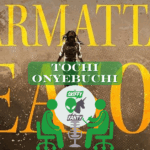As I mentioned back in June, whenever I attend a convention I always like to review something by one of the Guests of Honour. Last week my home con, Conflux, played host to Ambelin Kwaymullina, author of The Tribe series.
The Tribe begins with The Interrogation of Ashala Wolf. An environmental catastrophe called The Reckoning has visited our world. 300 years on, society has reconfigured itself, striving to preserve the Balance with the natural world. However, some people argue the Balance is upset by the presence of individuals possessing special powers—those with the ability to heal, control the elements or see potential futures. These individuals are assessed and either granted an Exemption or deemed an Illegal and kept in Detention Camps.
One such individual is Ashala Wolf. Ashala has a particularly powerful ability: as a Sleepwalker, her actions in the dream world affect the waking world… and she can do just about anything in her dreams. The catch is she has to be able to get to sleep first. Ashala is the leader of The Tribe, a group of teenagers and children with powers who have fled the rest of society and now seek refuge in the Firstwood. However, a betrayer walks among them. When the story opens, Ashala has been captured and must fight to preserve her memories and thus the safety of the rest of the Tribe.

The book’s structure is not straightforward. Although we begin with Ashala in captivity, chunks of the story are told in flashback as Ashala is interrogated. We see some of how the Tribe formed and how Ashala came to be captured. These flashbacks are carefully doled out as they become necessary to the story and serve to show what’s at stake. An extended sequence towards the middle of the book slows the pacing somewhat but remains engaging by introducing a significant twist.
The Interrogation of Ashala Wolf was first published in 2012 and is an Own Voices story. Ashala is a young woman with Indigenous Australian heritage, and the treatment of race is both important to and decentred by the narrative. Kwaymullina has created a world in which racism is no longer an issue. To paraphrase, the people of the world had other things to worry about in the wake of The Reckoning. Instead, discrimination happens along other lines. However, issues of race remain just under the surface of the novel. The language is a big clue: terms like Illegal and Detention Camp mirror the language used by the past and current Australian governments when discussing (non-white) immigrants.
Ashala’s Indigenous heritage also explicitly comes to play in the story through an encounter with the Rainbow Serpent. This significant figure in Indigenous culture is portrayed as responsible for the survival of life in Ashala’s part of the world after The Reckoning, which provides an in-fiction explanation of the distinctly Australian scenery. Which was something I loved. All too often, Australian SFF writers are told their work must be set in the US to sell. Novels that do make it to publication are often set in cities where there is little to distinguish them from other metropolises. A significant portion of The Interrogation of Ashala Wolf is set in the Firstwood, among the tuarts and the peppermint gum trees. I could just about smell the eucalyptus. Further afield, the landscape is one of desert and spinifex. It meant a lot to me to see these familiar vistas in print, and it made the secondary theme of living in harmony with nature resonate that little bit more.
But it was Ashala that kept me coming back. She’s a compelling character. Although she starts the novel in desperate straits, she never quite lets go of her fierceness. Ashala might possess an exceptional power, but her real strength lies in her relationships with others. She has a knack for seeing who people really are, flaws and all, then choosing to believe in them. She gives them whatever support she can to help them become their best selves. Unsurprisingly, she is deeply loyal to her friends and continually sacrifices herself for them. Indeed, readers should be aware that the opening mentions an attempt at suicide, as Ashala tries to avoid capture through death. In this story which deals with some difficult issues, it is Ashala that brings hope.
For all that is impressive about it—especially given it was a debut novel—the story does have its flaws. The ending involves a bit of deus ex machina that I wasn’t entirely satisfied by, even though there had been something of a set-up for it. I also found the twist in the middle somewhat predictable. This is perhaps not a big criticism, as I don’t think it was setting out to be a huge surprise. Indeed, on a reread I was impressed with the set-up. It’s possible I was primed for it the first time around because I’d recently read another work with a very similar twist. Ultimately, I didn’t find the lack of surprise to be a deal-breaker.
However, these are reasonably small quibbles. The Interrogation of Ashala Wolf is a tense and engaging story, deeply embedded in an Australian context and made stronger for it. It does an excellent job of examining serious issues while maintaining hope. I highly recommend it as the start of a compelling series.








One Response